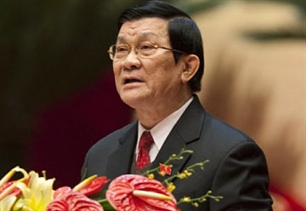Vietnam promotes all-round cooperation with the Philippines
State President Truong Tan Sang will pay an
official visit to the Philippines on October 26-28 to reiterate Vietnam’s
consistent policy of strengthening relations of friendship and multifaceted
cooperation with the island nation bilaterally and multilaterally. 
The visit, the first by Mr Sang since he was elected as President of Vietnam in July 2011, takes place at a time when the two countries are celebrating the 35th anniversary of their diplomatic ties this year.
Located in Southeast Asia, the Philippines is home to more than 7,000 islands, with 70 percent of its population living on agricultural production. Agriculture makes up 23 percent of its GDP. Its major farm products include rice, maize, coconut, sugar cane, coffee, tobacco, cotton, jute, beans and Abaca cotton fabric. The country imports approximately 2 million tonnes of rice every year, mostly from Vietnam, to feed the population.
Vietnam and the Philippines established diplomatic relations on July 12, 1976. They signed a framework agreement for bilateral cooperation in the first 25 years of the 21st century and beyond in November 2002. Since then bilateral friendship and cooperation based on mutual trust has developed well.
Two-way trade has increased annually in recent times. At the 4th meeting of the Joint Commission for Bilateral Cooperation in 2005, both sides set a target of raising bilateral trade to US$2 billion in 2010. However, the target was beaten in 2008 when trade hit US$2.2 billion. The figure then fell to nearly US$2 billion in 2009 due to the global economic slowdown, but climbed to US$2.4 billion in 2010.
The Philippines is one of few countries with an import surplus in trade with Vietnam. Since 2008, Vietnam has reached an annual trade surplus with the Philippines of more than US$1 billion, mostly from rice exports. The country exports around 1.5 million tonnes of rice to the Philippines every year, making up 50-60 percent of its exports to the island nation.
In addition to rice, Vietnam exports electronic spare parts and farm produce to the Philippines, and imports mostly fertilizers, machinery, minerals, liquefied gas, petrol, pharmaceuticals and building materials.
However, bilateral investment cooperation remains modest. There are no Vietnamese-invested projects in the Philippines. Meanwhile, as of August 2011, the Philippines had 55 operational projects in Vietnam capitalised at US$270 million, ranking 26th among foreign investors in the country.
Marine cooperation is one of the key pillars in their bilateral relations. Both countries have established a working mechanism for a joint group on the sea and ocean that meets every year. The group has convened seven meetings and has been upgraded into the Joint Commission on the Sea and Ocean at the Vice Foreign Ministerial level. The commission is scheduled to hold its first session in early 2012.
Since 1963, Vietnam has cooperated with the Philippines-based International Rice Research Institute (IRRI) and sent staff to the organisation for further study. To date, about 50 rice varieties from the IRRI, including IR64 – a key export variety, have been grown in Vietnam. The institute has also trained 254 Vietnamese scientists, including 55 at the Masters degree level and 29 doctorates. Some of the Vietnamese scientists have worked at the institute, namely Professor Vo Tong Xuan, Dr To Phuc Tuong and Dr Chu Thai Hoanh.
In 2010, both sides signed an agreement to identify specific areas of cooperation in seafood and established the Fishery Cooperation Committee in July 2011. They agreed to set up a hot line to deal with illegal fishing and to support fishermen.
Education and training is another potential area for bilateral cooperation. Both sides signed an agreement on educational cooperation in October 2010. The number of Vietnamese students in the Philippines has increased significantly in recent years.
The two countries have also signed several key cooperative documents, including a trade agreement in January 1978, an investment protection and encouragement agreement in February 1992, agreements on the establishment of the Joint Commission for Trade and Economic Cooperation in February 1992 and the Committee for Bilateral Cooperation in March 1994, an agreement on national defence cooperation in October 2010, and an agreement on rice trading in December 2010.
The Joint Committee for Bilateral Cooperation, co-chaired by the Vietnamese Minister of Foreign Affairs and the Philippine Secretary of Foreign Affairs, has held 6 sessions, with the latest taking place in Hanoi earlier this month.
During Mr Sang’s visit, both sides will discuss measures to increase cooperation in economics, trade, investment, national defence, security, education-training and culture. They will also explore ways to promote cooperation at regional and international forums.
(VOV)
Binh Duong Provincial Party Committee gives decisions on cadre appointments
 “Binh Duong youth proudly move forward”
“Binh Duong youth proudly move forward”
 Tan Uyen city overcomes difficulties to successfully complete tasks
Tan Uyen city overcomes difficulties to successfully complete tasks
 Provincial Women's Union promotes IT application and digital transformation
Provincial Women's Union promotes IT application and digital transformation
 Provincial Public Administration Service Center makes comprehensive innovation in administrative procedure settlement
Provincial Public Administration Service Center makes comprehensive innovation in administrative procedure settlement
 Economic - Budget Commission of provincial People's Council and Urban Committee of Hanoi municipal People's Council shares experience in building social housing and waste treatment
Economic - Budget Commission of provincial People's Council and Urban Committee of Hanoi municipal People's Council shares experience in building social housing and waste treatment
 Provincial Agencies Bloc’s Party Committee achieves and exceeds numerous targets in 2024
Provincial Agencies Bloc’s Party Committee achieves and exceeds numerous targets in 2024
 Streamlining apparatus: A revolution for national advancement
Streamlining apparatus: A revolution for national advancement
 Stepping up the tradition
Stepping up the tradition
 “Fighting army, working army”
“Fighting army, working army”


